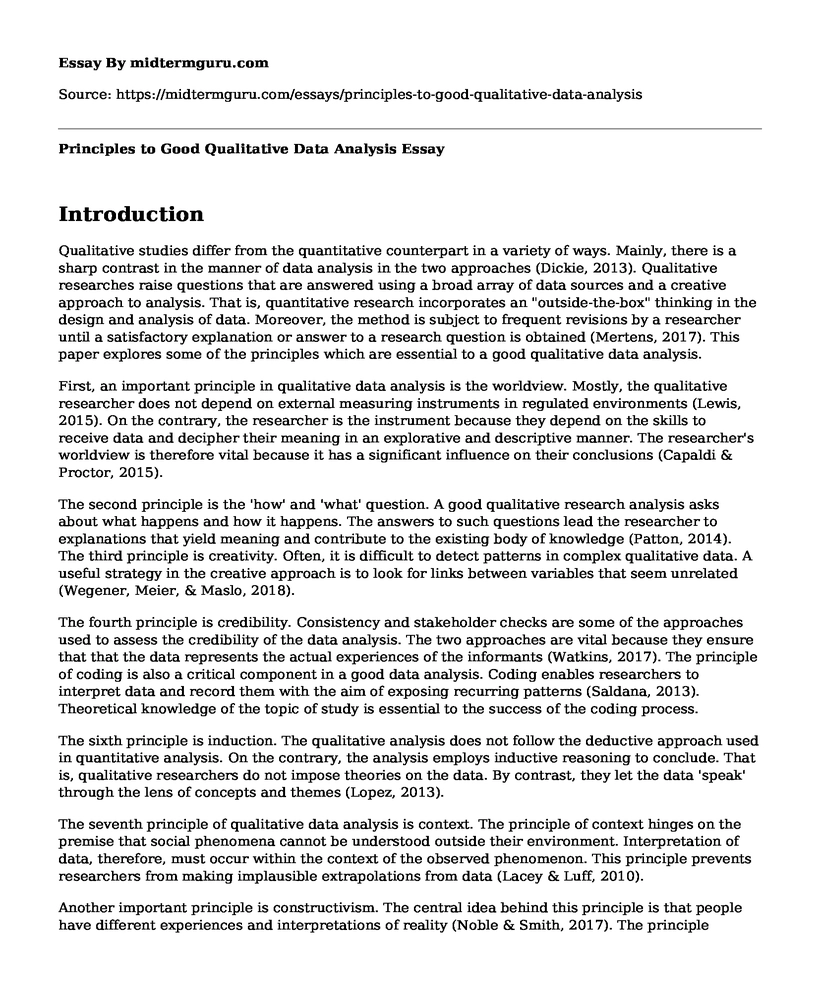Introduction
Qualitative studies differ from the quantitative counterpart in a variety of ways. Mainly, there is a sharp contrast in the manner of data analysis in the two approaches (Dickie, 2013). Qualitative researches raise questions that are answered using a broad array of data sources and a creative approach to analysis. That is, quantitative research incorporates an "outside-the-box" thinking in the design and analysis of data. Moreover, the method is subject to frequent revisions by a researcher until a satisfactory explanation or answer to a research question is obtained (Mertens, 2017). This paper explores some of the principles which are essential to a good qualitative data analysis.
First, an important principle in qualitative data analysis is the worldview. Mostly, the qualitative researcher does not depend on external measuring instruments in regulated environments (Lewis, 2015). On the contrary, the researcher is the instrument because they depend on the skills to receive data and decipher their meaning in an explorative and descriptive manner. The researcher's worldview is therefore vital because it has a significant influence on their conclusions (Capaldi & Proctor, 2015).
The second principle is the 'how' and 'what' question. A good qualitative research analysis asks about what happens and how it happens. The answers to such questions lead the researcher to explanations that yield meaning and contribute to the existing body of knowledge (Patton, 2014). The third principle is creativity. Often, it is difficult to detect patterns in complex qualitative data. A useful strategy in the creative approach is to look for links between variables that seem unrelated (Wegener, Meier, & Maslo, 2018).
The fourth principle is credibility. Consistency and stakeholder checks are some of the approaches used to assess the credibility of the data analysis. The two approaches are vital because they ensure that that the data represents the actual experiences of the informants (Watkins, 2017). The principle of coding is also a critical component in a good data analysis. Coding enables researchers to interpret data and record them with the aim of exposing recurring patterns (Saldana, 2013). Theoretical knowledge of the topic of study is essential to the success of the coding process.
The sixth principle is induction. The qualitative analysis does not follow the deductive approach used in quantitative analysis. On the contrary, the analysis employs inductive reasoning to conclude. That is, qualitative researchers do not impose theories on the data. By contrast, they let the data 'speak' through the lens of concepts and themes (Lopez, 2013).
The seventh principle of qualitative data analysis is context. The principle of context hinges on the premise that social phenomena cannot be understood outside their environment. Interpretation of data, therefore, must occur within the context of the observed phenomenon. This principle prevents researchers from making implausible extrapolations from data (Lacey & Luff, 2010).
Another important principle is constructivism. The central idea behind this principle is that people have different experiences and interpretations of reality (Noble & Smith, 2017). The principle promotes an open-minded approach among researchers because it guides them to treat each case uniquely. It offers a researcher the understanding that concepts may have many meanings depending on the context (Harding, 2013).
The understanding that human behavior evolves and occurs in a non-linear fashion is also vital to the analysis of qualitative data. Non-linearity of behavior here may imply unpredictability. That is, some rare phenomena produce insights into issues in unprecedented fashion (Malterud, 2011).
Triangulation is also an important principle in qualitative data analysis. The process involves cross-analysis of multiple sources of data to assess the degree of convergence of the evidence (Leech & Onwuegbuzie, 2010). The process increases confidence in the validity of the researcher's conclusions.
References
Capaldi, E. J., & Proctor, R. W. (2015). Is the worldview of qualitative inquiry a proper guide for psychological research? American Journal of Psychology, 251-269.
Dickie, V. A. (2013). Data analysis in qualitative research: A plea for sharing the magic and the effort. American Journal of Occupational Therapy, 49-56.
Harding, J. (2013). Qualitative data analysis from start to finish. New York: SAGE Publishers.
Lacey, A., & Luff, D. (2010). Qualitative data analysis. Yorkshire: National Institute for Health Research.
Leech, N. L., & Onwuegbuzie, A. J. (2010). An array of qualitative data analysis tools: A call for data analysis triangulation. School Psychology Quarterly, 557-584.
Lewis, S. (2015). Qualitative inquiry and research design: Choosing among five approaches. Sage Journals, 473-475.
Lopez, L. (2013). Induction and deduction as entry points into qualitative data analysis: How can early analytical choices affect the theorizing process. Americas Conference on Information Systems (pp. 11-20). Chicago: Western University.
Malterud, K. (2011). Qualitative research: standards, challenges, and guidelines. Lancet, 483-488.
Mertens, E. (2017). Qualibuddy: An online tool to improve research skills in qualitative data analysis. Emerald Insight, 21-29.
Noble, H., & Smith, J. (2017). Qualitative data analysis: A practical example. BMJ Journals, 12-17.
Patton, M. Q. (2014). Qualitative research & evaluation methods: integrating theory and practice. Thousand Oaks: SAGE Publications.
Saldana, J. (2013). The coding manual for qualitative researchers. Los Angeles: SAGE.
Watkins, D. C. (2017). Rapid and rigorous qualitative data analysis. International Journal Qualitative Methods, 19-27.
Wegener, C., Meier, N., & Maslo , E. (2018). Cultivating creativity in methodology and research: in praise of detours. Cham: Palgrave Macmillan.
Cite this page
Principles to Good Qualitative Data Analysis. (2022, Sep 28). Retrieved from https://midtermguru.com/essays/principles-to-good-qualitative-data-analysis
If you are the original author of this essay and no longer wish to have it published on the midtermguru.com website, please click below to request its removal:
- Qualitative Research on Reflective Practice in Nursing Critique
- Statistics Paper Example on Female Headed Households in Indonesia
- Statistics of the Demographics and Job Demand - Paper Example
- Evaluation Essay on Stericycle Inc.
- Ethical Considerations Specific to the Research Topic
- Case Study Research Method: An In-Depth Analysis - Research Paper
- Under Armour's Strategy in 2014 - Case Study







